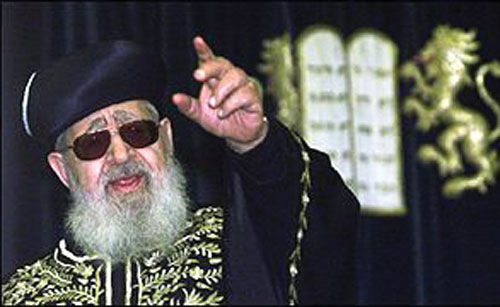.jpg)
Two weeks ago, the entire Jewish world mourned the passing of Sephardic Torah giant Rabbi Ovadia Yosef, who died at the age of 93. His passing was covered by Israeli and Jewish media and was noted in worldwide media. With estimates of 800-850,000 people attending his funeral in Jerusalem, it was clear the entire State of Israel—politicians, religious leaders, artists and simple citizens—all mourned him.
Many may wonder how it is that Rabbi Yosef, whose comments often drew the surprise and criticism of his opponents, also earned such broad recognition. How is it that a spiritual leader who spoke so many times in sharp terms became so beloved and respected by even those who opposed those same positions?
The answer is: They respected him for taking those same positions. No matter how far to the right or to the left, Israelis always respected the man who came to be known simply as “Harav Ovadia” for his leadership and willingness to stand up for what he believed in. Rav Ovadia never shied away from speaking his mind even on the most difficult of matters. And he didn’t just express his opinion, but also his feelings on the matter.
Speaking so strongly on so many things, Rav Ovadia showed his care and passion for everything that the Jewish people and the Jewish state were going through. In a generation where opinion and being opinionated are at times discouraged and a non-confrontational position is appreciated most, Rav Ovadia showed that a strong position—tough though it may be—is of great value, as it reflects caring and passion in a world lacking these qualities.
His ability and choice to have an opinion and to express it—notably in the political arena—were even more significant in the halakhic field. His rulings on the most difficult questions, such as brain death being an acceptable halakhic criteria for defining death thus opening the door to organ transplants; the prohibition on force feeding animals resulting with his ban on the consumption of duck liver; his ruling that non-Jewish soldiers whose conversion was expedited within their term of service in the IDF were acceptable—all are rulings that carry and will carry great weight in the Jewish world.
These decisions were widely respected not just because of the magnitude of his knowledge of Torah, his photographic memory and his outstanding brilliance. They were accepted because he cared, because he cared to address every issue and look through each one thoroughly and to make sure that those in need of an answer received that answer.
Another example for this is Rav Ovadia’s ruling on the Dakar submarine affair. In 1967 the Israeli submarine Dakar left Britain and in its way back to Israel tragically and mysteriously disappeared with the 69 crew members on board, 16 of whom had wives waiting for them at home. According to Jewish law this situation raises serious questions regarding the ability of these women to remarry with no evidence of their husband’s death. Upon receiving this question, Rav Ovadia locked himself in his apartment not leaving until able to find a halakhic solution for these women. Rav Ovadia did not lock himself in his apartment because of the intellectual challenge this question poses, nor did he immerse himself in study then for the sake of religious pursuit; he did it because he cared. He did it because anytime a decision needed to be made and a challenge needed to be met he cared enough about it whether he was asked or not.
Theodore Roosevelt famously said, “Nobody cares how much you know until they know how much you care.” This was the story of Rav Ovadia’s life: He did not only care to know in the most profound of ways, but he also knew how to care.
So when 800-850,000 Israelis from every possible walk of life came to give him his last honor in the largest funeral in Israel’s history, they came out of respect for Rav Ovadia’s genius and unparalleled Torah knowledge—they came for his caring to know. But they also came for another reason: to show respect for the man who knew how to care, to the man who was like a father to so many of them.
By Rabbi Elchanan Poupko








